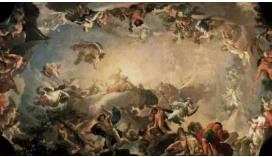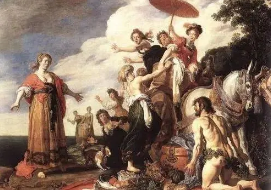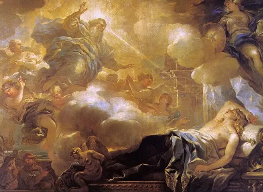On the multiple dilemmas of Western Urban Culture from English novels
11 min read
Through the analysis of many novels with urban background in contemporary British novels, it can be seen that there are numerous difficulties in contemporary western urban culture, which leads to the loss of the richness of the spiritual world and the richness of the spiritual world for contemporary urbanites who are surrounded by abundant materials. Without spiritual support and spiritual appeal, human beings are left with endless grabbing of materials, loss of humanity and lack of morality. Human beings become more and more indifferent to each other, and human beings themselves are alienated into machines, rich in material things, but forever lost the capacity for inner happiness.
So what exactly leads to the predicament of contemporary western urban culture? How to find a way of redemption for the contemporary urbanites trapped in multiple difficulties, so that the contemporary people can return to the mind and happiness as the core of the way of thinking and value system? To find the way to salvation, we must first find the ideological root of these dilemmas. The way of thinking of human beings has its inherent logic, which guides people’s moral orientation and value system. Therefore, we should first clarify the internal mechanism of human thinking mode, and then dig out the internal logic of thinking mode that causes multiple predicament of contemporary culture. Finally, we should start from the root and point out how to change this internal mechanism, so as to achieve the purpose of developing and even reshaping healthy culture fundamentally.
First of all, by sorting out the historical evolution of Western thought and culture, to understand the development of Western thought and culture, so as to clarify its internal mechanism.
Rationality is the core of Western thought and culture and the basic way of looking at the world. Adhering to the logical thinking mode of binary opposition, rational thinking runs through the whole history of western thought. In terms of thinking mode, Westerners view the real world in a rational way and construct the ideal kingdom in a rational way. The difference is that because of the different focus of different times, the pursuit of the way to construct the ideal kingdom is also different.
Ancient Greek gods The origin of Western thought and culture can be traced back to ancient Greece. Ancient Greek mythology in a sense shows a very unique way of thinking. The gods of ancient Greece, whether Zeus, the king of the gods, pursued women at will, or Aphrodite, the goddess of love and beauty, persecuted Cupid’s lover because of jealousy and hatred, and her own sex, with the god of war, can be read the indulging spirit of desire contained in Greek mythology. In line with the most authentic and free life cognition, the Greeks regarded desire as the way to reach the ideal kingdom. Therefore, although their behavior seemed to be irregular, they essentially aimed to realize the transformation from the real kingdom to the ideal kingdom through the promotion and realization of desire, that is, the appearance of indulgence was the core of rational pursuit, but this core was interpreted by the Greeks as desire. When history developed to the Middle Ages, human behavior got rid of the indulgence of desire under the infiltration of religion, and turned to belief as the starting point, so that all behaviors were in line with faith as the highest purpose. Medieval people believed that only by following divine guidance and suppressing earthly desires could they reach the ideal kingdom. Until the Renaissance, he began again to extol the beauty of human nature and the joy of this world. The re-affirmation of human value once again made the publicity of human nature and the affirmation of human nature as the first essence of action, and the publicity of human nature became the way for people in the Renaissance to explore the ideal kingdom.
During the Enlightenment period, due to the great development of human rationality, the precision and meticulousness of science and technology rationality were highly advocated. Therefore, human began to take rationality as the starting point of all behaviors, and applied methodology and logic in all fields, even including the trifles in daily life. This kind of rational thought believes that as long as people rely on their critical thinking ability and improve their scientific level, they can achieve the ideal kingdom of freedom, finally realize their dreams, and greatly improve their living standards in reality. However, due to the rigorous, precise and heavy, people’s emotional cognition is covered by logic and wisdom. After Enlightenment, Romanticism has emerged in the history of western culture and literature. This trend of thought in a short period of time, in a specific field to change the rational as the purpose of the thinking mode, advocate the emotional as the core of the way of thinking. It emphasizes emotion, individuality and imagination. It believes that human behavior should be guided by inner emotion rather than controlled by external reason. It also believes that efforts to return to the ideal world can be achieved through emotional publicity, emotional release and emotional conversion. Although the brief emotional publicity is a brilliant release in the history of Western thought and culture, the process of industrial revolution stopped the romantic trend of thought on the road of high spirited catharsis, and the overcorrection behavior made Romanticism finally stay in the field of literature and art, in the fire of self-burning passion, leaving a bright and magnificent burst of emotions for the world. But it doesn’t really get to the ground and make a real difference in real life. In addition, the worship of science and technology and rationality accompanying the Industrial Revolution once again made people see the beautiful life brought by rationality. Therefore, along with the machine noise of the industrial revolution, the core of rationality throughout the history of Western thought was pushed to the top and developed into instrumental rationality, which made the instrumental thought penetrate into the whole scope of production and life.
London in the Victorian era By combing the history of western ideology and culture, we can see that the core of thinking in different historical stages is intrinsically different, but the internal structure of thinking mode is consistent. No matter in which stage and which mode of thinking, fundamentally speaking, is the embodiment of a way of looking at the world, and this way of looking at the world has the same starting point, that is, to realize human freedom, reach the ideal kingdom, and make human society more beautiful. However, different stages rely on different carriers. In the Greek period, it was “desire,” in the Middle Ages, “theology,” in the Renaissance, “humanity,” in the Enlightenment, “technology,” in the Romanticism, “emotion,” and in modern society, “tools.” From this, we can see that Westerners have been exploring the way to realize human ideals, and have made different attempts in different periods. If the real world is A and the ideal world is B, then “desire”, “theology”, “humanity”, “science and technology”, “emotion” and “tools” are the ways that human beings hope to change the real world and achieve the ideal kingdom through these thinking cores. That is:
Although different attempts have led to different problems at different times, the search for the ideal kingdom of human beings in Western thought has never stopped. By exploring the logical composition of these different ways of thinking, we can find that they have different cores, but the same internal mechanism. They are all looking for a fulcrum of behavior to guide behavior, aiming at achieving the most ideal state of human beings and realizing ultimate freedom.
Secondly, the active function of thinking mechanism with instrumental rationality as the core. After Romanticism, scientific and technological progress brought about by the Industrial revolution enabled human beings to move towards a more mechanical rationalism after a brief emotional outburst. The above article discusses the intrinsic logic and critical essence of instrumental rationality. However, instrumental rationality does not come out of thin air. It has deep ideological roots and historical origins. Since the Renaissance and the bourgeois revolution, the western world has entered a brand new historical stage marked by industrial civilization.
“If we define industrialization as the result of the coordinated development of economic specialization, the mechanization of mass products, mass consumption, and the mass distribution of goods and services, it is necessary to reiterate that such a coordinated development could not have taken place before the last thirty years of the nineteenth century. The construction of railroads and canals, the increasing use of water and hydroelectric power, and the establishment of the factory system beginning in the 1850s laid the foundation for industrial development”.
This period is mainly marked by people’s growing confidence in themselves and their increasing belief in the power of reason to achieve the ultimate ideal of mankind. The internal mechanism of the thinking mode with instrumental rationality as the core is to achieve the purpose of vigorously developing science and technology and bringing well-being to human beings through the publicity of speculative rationality and logical rationality. This mode of thinking is reflected in life, which means that everything is instrumentalized and the core of everything is to consider whether things have utilization value, whether they can create value and whether they can bring benefits. In other words, “desire”, “theology”, “humanity”, “technology” and “emotion” are replaced by “tools”. Anything that can be regarded as a tool, anything that can bring material benefits to human beings and enable human beings to achieve material pursuit is useful and desirable, otherwise it should be abandoned. Instrumental rationality has indeed played an indispensable role in material production and the development of science and technology. The material life of human beings has become richer and more prosperous, and human beings are enjoying comfort and convenience that people could not imagine hundreds of years ago.
Thirdly, instrumental rationality drives out emotion and erodes humanity. As mentioned above, the germination of instrumental rationality can be traced back to the Renaissance, when human nature was the core of the thinking mode, but the recognition and pursuit of rationality had begun to emerge. In the Renaissance period, Leonardo Da Vinci, with his extremely powerful personal ability, completed a lot of achievements that are still incomprehensible. He not only contributed countless amazing paintings to the world, but also became the representative of using human rational power to achieve endless achievements through his research on biology, machinery and even weapons. People can achieve unimaginable greatness through their talent, their ability and their persistence. If in Da Vinci’s time, human rationality still contained some humanistic color, and rigorous rationality still shone with beautiful artistic and spiritual light, then with the development of history, human’s worship of rationality has increasingly driven out individual and changeable emotions. When it came to the Enlightenment period, Bacon’s “knowledge is power” and Descartes’ “cogito, therefore I am” era raised the flag of reason to an unprecedented height. Literature and art should be the product of emotion and spirit, and the literature of this era is full of the power of rational speculation. Robinson Crusoe’s focus on the conquest of nature by reason is the pinnacle of human rational literature. Robinson’s world has no love, no wife and children, no wind, only success or failure. The history of his efforts is exactly the history of western natural science to the glorious. In the works of the same period, there are Gulliver’s Travels under the cloak of fairy tales and Pamela under the cloak of love. However, these works are just under the cloak. Gulliver is not a fairy tale, but expresses the author’s most rational views and criticisms through the narration of fairy tales. “Pamela” is even less romantic, but only discusses how to apply logic and reason to the field of marriage, so as to achieve the maximum personal interests. “Pamela” can be said to be the precursor of how to elaborate and marry into a rich family, the novel has no love; Have success without happiness; Material without spirit. Rationality gradually invaded from the field of science and technology to the field of literature and art, from the field of industry to the field of emotion.
Robinson and Friday Modern people expect to expand their knowledge by studying things, and dig for the roots of things by analyzing the surrounding nature. By applying the knowledge gained from his studies to the things of nature, man hopes to construct a well-ordered life for himself, for his age, and for his followers. The methods they use are so precise that they can withstand any kind of testing and demonstration, and their research is scientific.
Rational thought has greatly promoted the development of science and technology, and natural science based on reason has also struggled to develop in the pain of breaking the old feudal forces and religious bondage. All the advanced elements in history have a strong internal impulse, which is to conquer and dominate nature. To achieve this goal, we must first discover the laws of nature. Therefore, a kind of pragmatism and scientific rationalism began to affect people’s way of thinking.
The worship of reason and the development of reason undoubtedly bring great benefits to the development of science and technology. Through analysis and research, human beings learn more and more about the world and nature, and on this basis, make better use of nature, complete more and more inventions, construct more and more sophisticated science, develop more and more perfect technology, and manufacture more and more advanced products. However, the core of the problem is that people have emotions, and the emotional world cannot be analyzed and divided by reason.
Technology has not only reduced individual freedom, it has also conquered nations. Toynbee once wrote, “The distinguishing feature of the plane of economic society is the constant battle waged between the systematization and organization that the machine industry has created and imposed on man and the stubborn resistance of human nature to being systematized and organized.” “The crux of the problem is the disheartening fact that mechanization is inseparable from the police,” he said. Systematisation is as good as hell, and the word “police” is too rough to apply to our supposed democracy.
This is the fatal problem of technological development. When all the categories related to human and humanity are systematized and organized, what we face is the loss of human personality, human thought and human emotion. When this kind of rationality intrudes into the emotional category of the human world, it will plan the flexible emotions into clear and rigid logic and rationality, so that the foundation of human being is destroyed, people will become precise and hard machines, and brutality will therefore become a popular fashion rampant in today’s cities and the world. The core problem of contemporary urban culture is that reason has completed the assimilation and enslavement of emotion. In this way, all categories belonging to man are mapped out by reason, that is, all are connected with a rigorous purpose. In other words, everything becomes a means, becomes a tool. “Tool” has become the core of guiding people’s thinking, that is, all tools humanity, emotion and happiness become available tools. Under the guidance of this mode of thinking, obtaining material benefits and material success has become the only standard to measure happiness and success.






